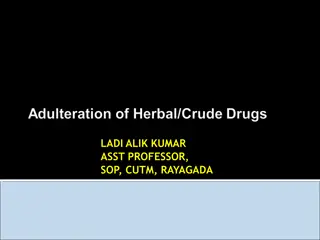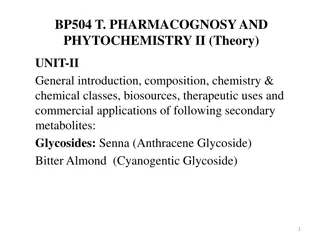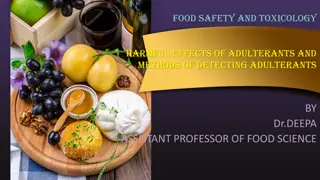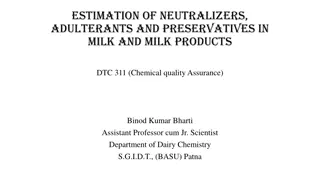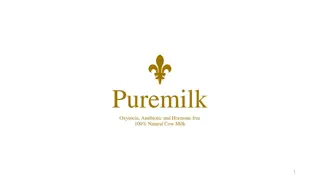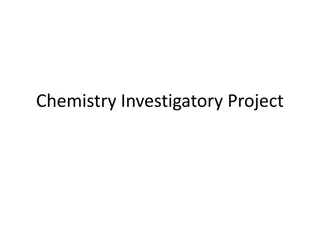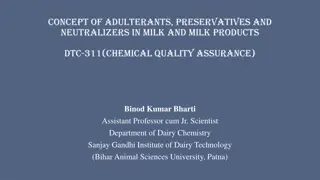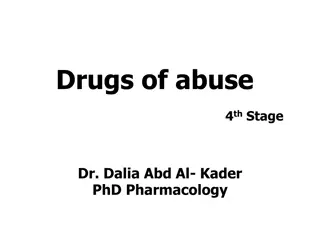Understanding Adulteration in Drugs and Food Industry
Adulteration is the deceptive practice of substituting original substances with inferior or harmful ones. Deliberate and accidental adulteration can lead to health risks and financial gains. Different types of adulterants, reasons for adulteration, and ways to prevent it are discussed in this inform
1 views • 34 slides
Comparison of Alexandrian Senna and Indian Senna: Pharmacognosy and Phytochemistry Insights
Explore the pharmacognosy and phytochemistry of Alexandrian Senna and Indian Senna, detailing their collection, preparation, macroscopic and microscopic characteristics, chemical constituents, and potential adulterants. Learn about the therapeutic applications and commercial significance of these gl
0 views • 30 slides
Food Safety and Toxicology: Adulterants and Detection Methods
Food adulteration can have harmful effects on health by altering the natural composition of food. Learn about the risks of adulterants, their effects, and methods for detecting them in food products. Ensuring food safety is crucial to prevent toxic compounds and nutrient deficiencies that can impact
0 views • 15 slides
Milk Quality Assurance: Detection of Neutralizers, Adulterants, and Preservatives
This study focuses on techniques for estimating neutralizers, adulterants, and preservatives in milk and milk products, including tests for Rosalic Acid, alkalinity of ash, sugar, starch, and glucose. Each test involves specific procedures using apparatus and reagents to detect the presence of certa
0 views • 17 slides
The Dark Reality of Milk Industry Adulteration in Kolkata
A shocking exposé reveals the grave dangers lurking in Kolkata's milk industry - cows injected with illegal drugs, contaminated feed and water, and mafia operations. Milk available in the market is tainted with fatal adulterants like oxytocin, antibiotics, and growth hormones, posing serious health
0 views • 26 slides
Investigation on Detection of Food Adulteration in Chemistry
This chemistry investigatory project focuses on detecting food adulteration through various experiments. Experiment-1 aims to detect adulterants in fat, oil, and butter, while Experiment-2 investigates adulteration in sugar. Experiment-3 aims to detect adulterants in chili powder, turmeric powder, a
0 views • 18 slides
Understanding Adulterants, Preservatives, and Neutralizers in Milk and Milk Products
Adulteration in milk involves adding cheaper substances or removing valuable constituents to make extra profit. Common adulterants include carbohydrates, salts, neutralizers, preservatives, detergents, and oils. Preservatives like hydrogen peroxide and formalin are used to prolong shelf life. Neutra
0 views • 13 slides
Understanding Cocaine: Effects, Risks, and Complications
Cocaine is a powerful stimulant that affects the central nervous system, causing intense euphoria followed by a crash. Its effects include CNS stimulation, pleasure center activation, and potential toxicity from adulterants. Cocaine is commonly abused with alcohol, creating a cardiotoxic metabolite.
0 views • 22 slides
